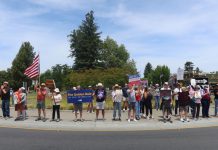Residents of Sebastopol made their disapproval of the Woodmark Apartments planned for Bodega Avenue known at the Sebastopol City Council’s Aug. 3 meeting. The council, however, refrained from passing judgment or responding to questions and comments directly — in part because the decision may be out of their hands. That’s because the developer, The Pacific Companies, has applied for approval for the 84-unit, affordable apartment complex via a streamlined state process created by California Senate Bill 35, effectively making an end run around Sebastopol’s design review board and the city council itself, which may be forced by the constraints of the process to approve the project.
If the project qualifies for the SB 35 process and the applicant submits a formal application, the City of Sebastopol has 60 days to review the proposal’s eligibility regarding the city’s own adopted standards and 90 days to decide its fate, according to Planning Director Kari Svanstrom.
Ultimately, the council directed City Manager Larry McLaughlin and the agenda setting committee to hold another informational session for the public when the project’s 60-day review window arrives.
Council members Neysa Hinton and Patrick Slayter recused themselves from the discussion, including the direction, due to their own proximity to the development. Mayor Una Glass said the informational meeting will happen after August, but in the near future, and that the planning department would provide updates rolling in on the city website.
Sebastopol and the power of SB 35
The developer proposed entirely affordable apartments with 84 units, with 48 units reserved for agricultural workers and retirees, as stated in the general project overview here. The units with one to three bedrooms at 7716 and 7760 Bodega Ave. are intended for families, seniors and others with 30% to 60% of the Area Median Income (AMI), the overview said.
Among other requirements, the Woodmark Apartments project has to meet all objective zoning and design standards per Sebastopol’s municipal code or adopted standards set by different public agencies to qualify for the SB 35 process, according to a presentation by Alex Mog, an attorney from Meyers Nave assisting the city.
Further, the site needs to have land use zoned or designated in the general plan to allow for residential use. Objective standards, like height limits, density and setback requirements, “involve no personal or subjective judgment by a public official and are uniformly verifiable,” per Mog’s presentation.
Approval in the SB 35 process is ministerial, Mog said, “So, if it complies with all these requirements, the city has no choice but to approve the project.”
Svanstrom said the city has notified “various tribes with interest in our area,” and entered confidential tribal consultation, while also reviewing the project’s eligibility for the streamlined process. The Federated Indians of Graton Rancheria brought up a complication now in consultation between the city and the tribe, she said.
The tribe asked for more site survey work as the development is close to known cultural resources, Svanstrom said. The Pacific Companies cannot apply for streamlined review through SB 35 until consultation is complete and the applicant agrees to any measures or changes the tribes request, according to Svanstrom’s flowchart of the SB 35 process.
If the applicant doesn’t agree, the project gets kicked back to the city’s usual way of application. If the applicant accepts, The Pacific Companies can submit their formal application on the SB 35 track, the planning director said.
At that point, the City of Sebastopol assesses the project’s qualifications and has 60 days upon its formal submission to determine if it meets the city’s adopted, objective standards, including zoning ordinances, tree ordinances and non-discretionary standards in the municipal code, she said.
Mog said that if the city doesn’t give comments in writing that point out any inconsistencies in those 60 days, the project is “deemed to comply with all standards” according to state law.
Meanwhile, the applicant must resolve its inconsistencies, Svanstrom said. The city has an additional 30 days, or 90 days in total, from when the application is formally submitted to pass or fail the application, per state law, she said.
Residents speak their mind on environmental and traffic safety concerns
Despite public objection during the meeting, Glass held that the council members swear in their oath of office to become a semi-judicial body when considering land use.
Glass said council members are informed by the city attorney and in trainings on ethics and on how to be on a city council that “if we express a predisposed opinion about any particular land use matter where we are sitting in judgment of that, then we have excluded ourselves … and therefore we cannot participate in the decision-making process.”
The mayor continued, “So, please do not expect any judgment or expression in either direction from any of us on the city council because if we were to do so, we’d have to exclude ourselves from any future judgment-making process,” Glass said.
Glass said she wanted the public to understand the council’s role in the matter and get the information to engage. “And it is not only our city attorney, this is like the State of California, this is a requirement for what we do,” she added.
Many attended the Zoom meeting to vocalize concerns about pedestrian safety, particularly for seniors and children, environmental impacts to heritage trees, the neighborhood evacuation route and traffic with dozens more cars expected on the road that may park on nearby streets, overflowing from the provided parking spaces.
The streamlined process does not require a California Environmental Quality Act study, to the great concern of some community members.
Attendee Redwing Keyssar said, “The fact that an environmental impact report is not even being required of a project that we know is going to have a huge environmental impact, it’s just absurd if not unethical.”
Tiffany Lucas voiced concern with the amount of soil to be removed from the site and whether the project’s planned retaining wall would be deep enough to damage neighboring trees.
“Traffic on the surrounding residential streets will also increase, impacting the safety of pedestrians of all ages who walk into town onto several schools nearby,” she said, mentioning “Bodega, Washington, Leland and Robinson and Dutton and Nelson, which all lack continuous sidewalks” and asking who will be responsible for adding those walkways.
Chuck Hoffman urged that the council should take a more active role in informing the public and resisting the development. “How come the community doesn’t know what’s going on?” he asked. “If there’s a fire, people are not getting out of town. I live on Washington now and oftentimes the traffic is backed up from the 116 all the way almost to Pleasant Hill.”
He continued, “It’s dangerous, it’s ill-conceived, it’s inappropriate. I can’t believe that the council’s hands are so tied they’re just going to hire a lawyer like the fellow who spoke and tell you all the reasons you can’t do jack about it. I think we can do some jack about it.”









